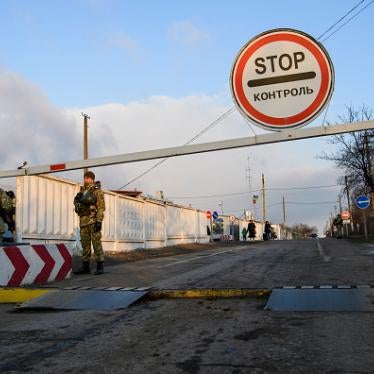July 13, 2020
Dmytro Kuleba
Minister of Foreign Affairs
Ministry of Foreign Affairs of Ukraine
1, Mykhailivska Sq.
Kyiv, 01018
Telephone: +38 (044) 238-16-57, +38 (044) 238-18-88
E-mail: zsmfa@mfa.gov.ua
Maryna Lazebna
Minister of Social Policy
Ministry of Social Policy of Ukraine
Str. Esplanadna, 8/10,
Kyiv, 01601
Telephone: (044) 289-86-22, (044) 289-70-60
E-mail: infozapit@mlsp.gov.ua
Dear Ministers Kuleba and Lazebna,
Please accept our greetings on behalf of Human Rights Watch. We are writing to urge your ministries to recommend that Ukraine ratify the Council of Europe Convention on the Prevention of Violence against Women and Domestic Violence (Istanbul Convention). which seeks to prevent and combat domestic and sexual violence against women and has been signed by all European Union (EU) member states.
Human Rights Watch is an independent international organization that works in over 90 countries to defend people’s rights. Human Rights Watch does not receive funding from any government. Our organization has conducted research on women’s rights, in particular violence against women and domestic violence, in dozens of countries around the world, including Turkey, Armenia, and other countries in the Council of Europe region.
We recently became aware of President Volodymyr Zelensky’s statement regarding his intent to submit the Istanbul Convention for ratification to the Verkhovna Rada, once the Foreign Ministry and the Ministry for Social Policy take proper action. We understand that he made this statement in response to letters and petitions he received, signed by tens of thousands of people, urging him to submit the convention for ratification.
Ukraine took an important step towards enhancing protection for women from violence when it signed the Istanbul Convention nine years ago. It is now time for Ukraine to join the 34 Council of Europe member states that have ratified it.
Violence against women remains a serious problem of public concern in Ukraine. A 2019 survey led by the Organization for Security and Co-operation in Europe (OSCE) found that in Ukraine, “Most women are concerned about the issue of violence against women, with 64 percent saying it is a common occurrence. Two-thirds (67 percent) of women state that they have experienced psychological, physical or sexual violence at the hands of a partner or non-partner since the age of 15.”
In 2017, in its concluding observations on Ukraine’s eighth periodic report, the UN Committee on the Elimination of Discrimination against Women (CEDAW) observed that since 2014, ongoing violence in the Donetsk and Luhansk regions and pervasive corruption have “contributed to an increase in the level of violence against women by State and non-State actors and to the reinforcement of traditional and patriarchal attitudes that limit women’s and girls’ enjoyment of their rights.” The report expressed concern over the underreporting of domestic and sexual violence, and noted a lack of disaggregated data on the problem and insufficient shelter spaces for women escaping violence. It also notes the need for greater capacity to investigate, document and prosecute cases of sexual violence and strengthening of services and support for survivors. The Covid-19 pandemic has exacerbated domestic violence in countries around the world, and Ukraine is no exception.
In recent years, Ukraine’s authorities have taken several important steps towards addressing violence against women. These include the government’s commitment in 2015 to UN Sustainable Development Goal 5, on gender equality, and the elimination of all forms of violence against women and girls in the public and private spheres. In 2018, it approved a National Action Plan for the implementation of recommendations made by the UN CEDAW. In reporting on the implementation of CEDAW’s recommendations in December 2019, the rapporteur on follow-up called on Ukraine’s government to “accelerate the ratification of the [Istanbul Convention].”
These steps also include the adoption of the 2017 Law on Preventing and Countering Domestic Violence, and amendments to the criminal code criminalizing “systematic” acts of domestic violence. While this legislation is welcome, it requires ongoing commitment to ensure implementation and additional action is needed to address remaining gaps. Expediting ratification of the Istanbul Convention is a crucial step for Ukraine in its fight against domestic violence. It would require the government to uphold minimum standards for preventing violence against women and girls, holding abusers to account, and supporting survivors.
We hope your ministries will take this opportunity to ensure the protection of women against violence by recommending to President Zelensky that he submit the Istanbul Convention to the Rada for ratification. This will help ensure protection from violence for women in Ukraine and will demonstrate to Ukraine’s international partners the country’s commitment to advancing women’s rights.
We thank you for your attention to this matter and we look forward to receiving your response.
Kind regards,
Hugh Williamson
Director, Europe and Central Asia Division
Human Rights Watch
Amanda Klasing
Director, Women's Rights Division
Human Rights Watch







